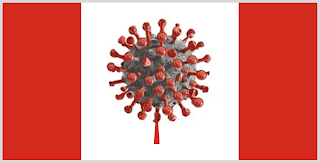Special Report: The Soft Logic of Hard Border Closures
Today's post is by Corona-zona Senior Canada Correspondent
Salishsailor.
Many countries have set hard border closures as a way to block the spread of COVID-19. Canada is one of them. All “nonessential” travel across the U.S.-Canada border has been blocked since mid-March 2020. What’s “nonessential” and what’s “essential,” though, depends on where you stand. Literally.
At the national level, “essential” means “any nondiscretionary travel,” which is equivalent to saying that essential means . . . what, obligatory? Mandatory? Who knows? The hard closures might better allow people to comply if authorities circulated behavioral descriptions of the terms. At the national level it remains murky.
British Columbia—the province I’m most focused on, because I’m moving to BC when I can get access—has made a stab at defining cross-border “essential” travel. Included are such reasons as fleeing the risk of abuse or violence; working, both paid and volunteer; getting healthcare; or attending a funeral. There are many other helpful examples in the Ministerial Order.
But nowhere in the Order do I see relocating your pets or livestock. That’s important, because right now my horses are residing in BC, as my wife and I wait on Lummi Island, Washington for the border wall to open. We shipped them by a horse transporter last month. So: Horses okay, people not so much?
What the commodification of our horses—who are family members to my wife and me—suggests, though, is that the hard border closure apparently has some soft spots. The press has reported over the past week several other instances of soft spots that reveal the soft logic of hard border walls.
Some U.S. communities near the border have coordinated efforts with groups of one-dose Canadians to supply them with surplus vaccines in the U.S. Manitoba announced that 4,000 truckers will get their jabs courtesy of North Dakota Health and Governor Doug Burgum, who set up roadside clinics and sourced the vaccines.
In Montana truck drivers also are getting vaccinated, and the Blackfoot Confederacy have established roadside stations with two queues—one for Canadian Blackfeet and the other for any Canadian citizen. Similar sharing arrangements are going on at New York’s border with Quebec and Ontario and in Alaska.
While special exemptions are required for vax-seekers to cross the border and return without the onerous quarantine and testing process, it can and is being done. More and more. And the trend illustrates two basic flaws in hard border closings.
First, they block the possibility of sharing surplus resources, like vaccines, by initiatives among international neighbors of good will. And second, if any exemptions are allowed, the list of “essential” activities is theoretically endless. That’s the soft logic on both sides of border walls.



